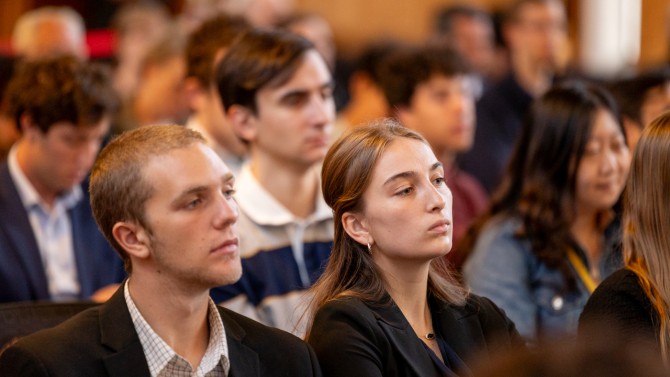Is American dominance on the world stage the best defense against tyranny and evil? That is the question two campus visitors discussed in a public debate Oct. 8 at Willard Straight Hall's Memorial Room.
Arguing the affirmative was Mary Kissel, former adviser to former Secretary of State Michael R. Pompeo, and current executive vice president and senior policy adviser for Stephens, Inc., a privately owned investment bank. Arguing the negative was Justin Logan, director of defense and foreign policy studies at the Cato Institute, a think tank headquartered in Washington, D.C. Sarah Bedford, investigations editor for the Washington Examiner, moderated the debate.
Students watch the debate, which was sponsored by the Steamboat Institute, a nonpartisan nonprofit that promotes America's first principles and encourages civil discourse, as well as by the Cornell Political Union, the Heterodox Academy Campus Community at Cornell, Cornellians United for Free Speech and Cornell Republicans.
President Michael I. Kotlikoff gave opening remarks preceding the debate, which drew 130 attendees.
Cornell's motto, "… any person … any study," he said, "reflects not only an aspirational vision of access to knowledge, but the commitment of our community to be a place where all people, and all knowledge, are welcome; where we might disagree with each other, and with ideas, but we never shut down opposing viewpoints."
The debate was sponsored by the Steamboat Institute, a nonpartisan nonprofit that promotes America's first principles and encourages civil discourse, as well as by the Cornell Political Union, the Heterodox Academy Campus Community at Cornell, Cornellians United for Free Speech and Cornell Republicans.
Kissel said America's dominance on the global stage is the best defense against tyranny because of the U.S.'s founding ideals, the reality of the world we live in, and the historical record.
Isolationism is not an option in the real world, she said, because U.S. interests and way of life are constantly threatened at home and abroad. And the way the U.S. counters threats is "fundamentally good," by building alliances and opening economies. In the last century, American power defeated fascism, midwifed Asia's democracies, helped collapse Soviet totalitarianism and allowed the global trading system to flourish. "In contrast, every time the U.S. stepped back from leadership, tyranny fills the void," Kissel said, pointing to examples from Vietnam to Cambodia, Nicaragua and Ukraine. "There is no alternative to American power that would protect our freedoms."
Logan countered, saying that while the exercise of American power is not inherently bad, the U.S. should reserve its foreign policy for pursuing U.S. sovereignty. In contrast, global dominance says that everything is a priority, which demands enormous resources, he said. While one might argue that China is the preeminent problem facing U.S. foreign policy, instead America is engaged in Ukraine, Israel, Palestine, Yemen, Iran and Venezuela. "There are no criteria for limits here, and lots of lubricant for foolish action," Logan said.
Rather than seeking global dominance, he said, the U.S. should seek to deny other countries from dominating their regions, as it has done in the past. The U.S. didn't want Europe to be dominated by Kaiser Wilhelm during World War I, by Adolph Hitler in World War II, and by Joseph Stalin or any successors during the Cold War. "That is a successful approach … and it is an approach that we should return to," Logan concluded.
Kissel and Logan also discussed other aspects of U.S. foreign policy, from involvement in Ukraine to the globalization of economies and the role of human rights, immigration and cybersecurity.







